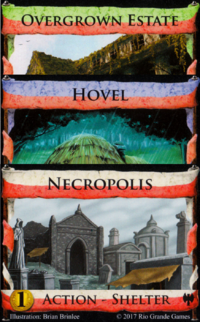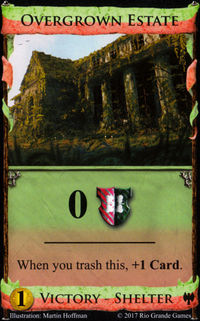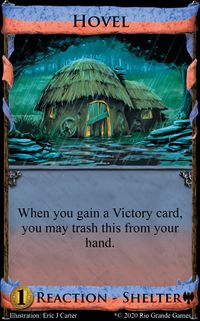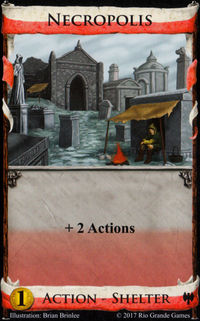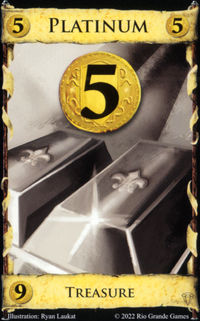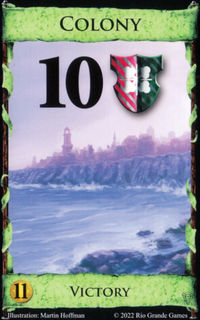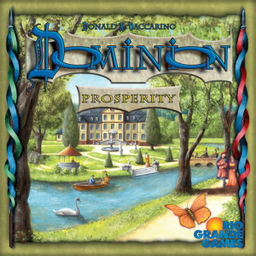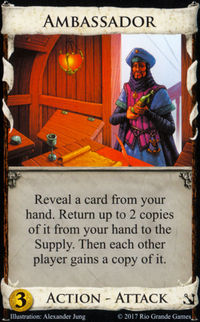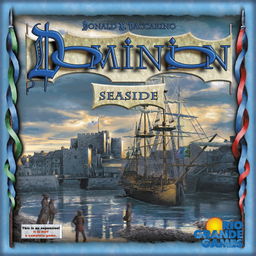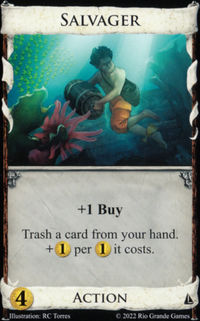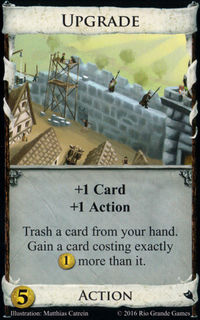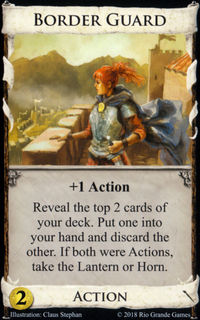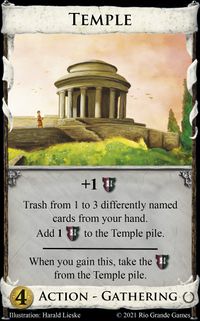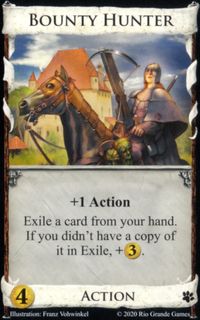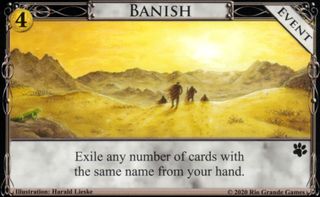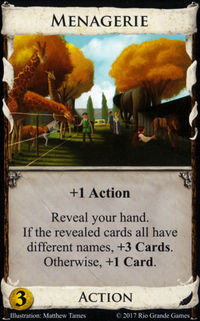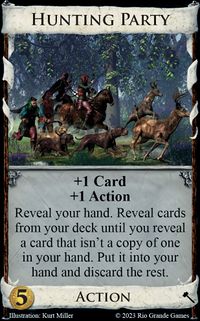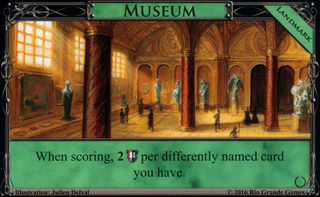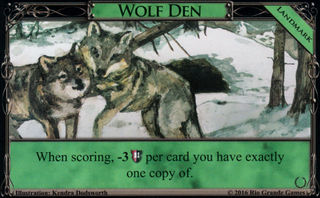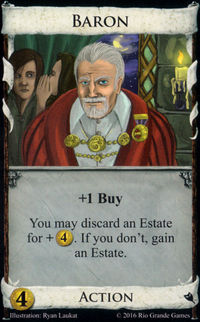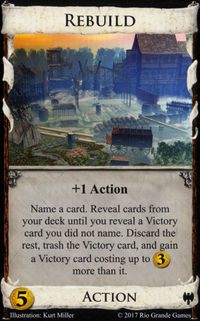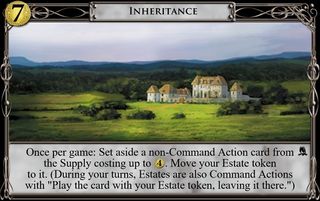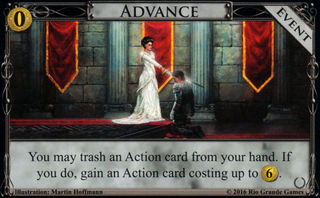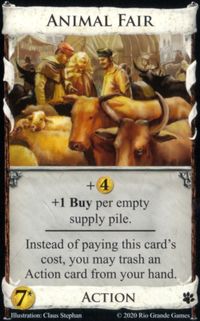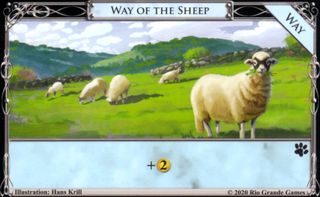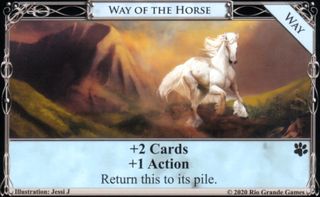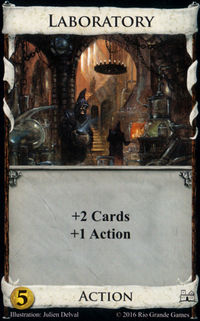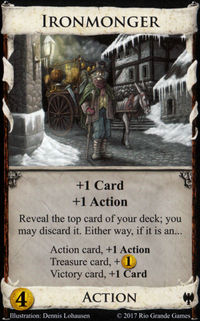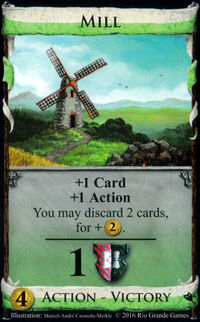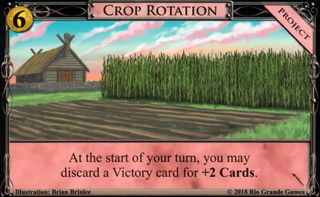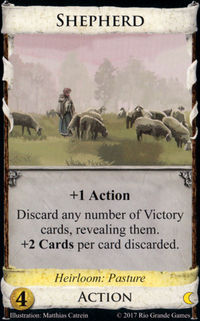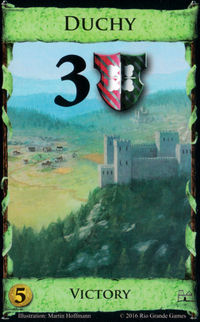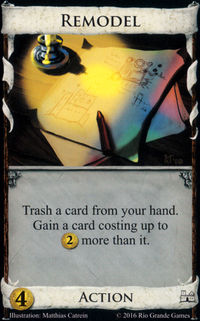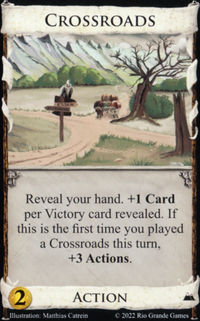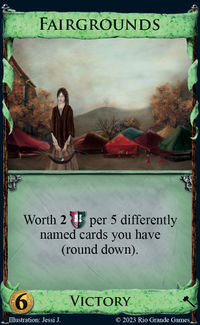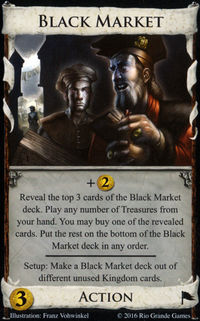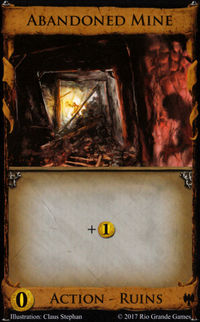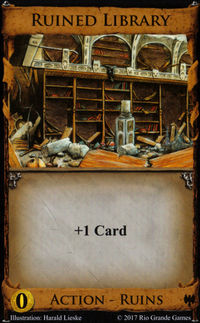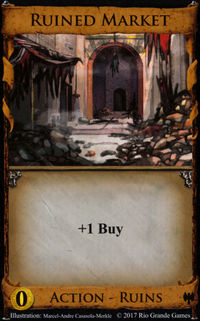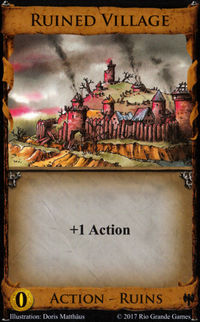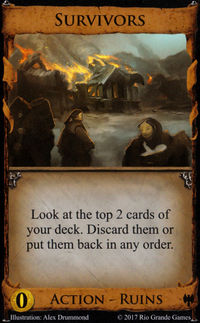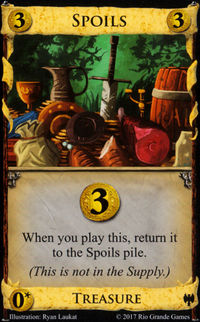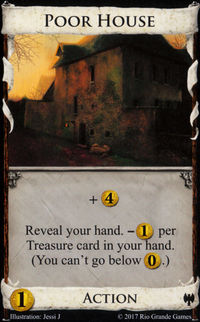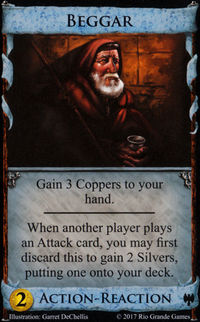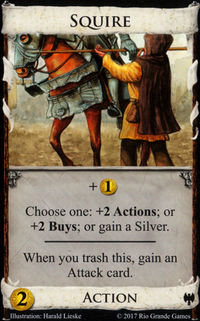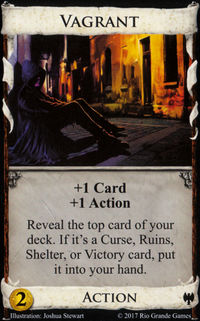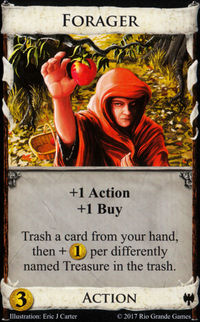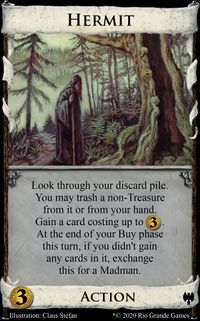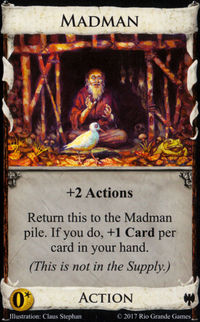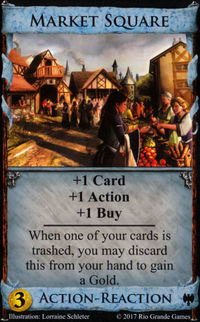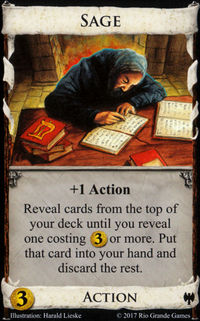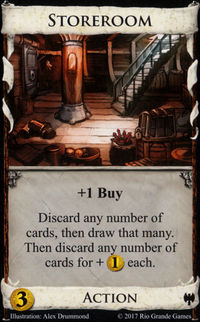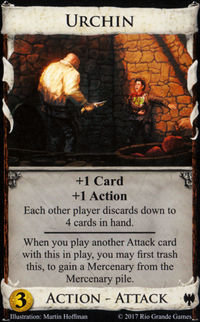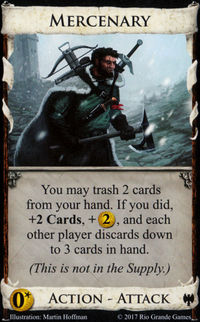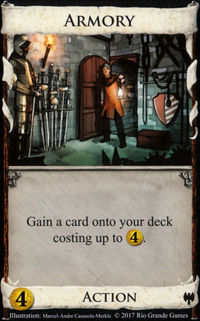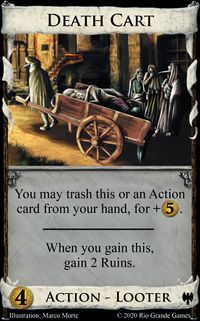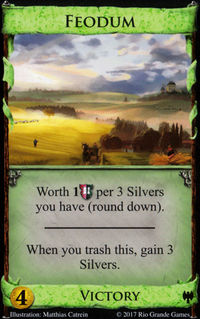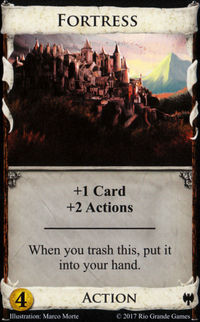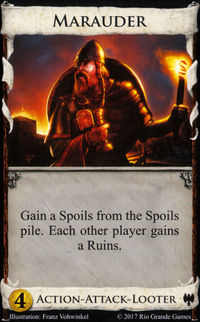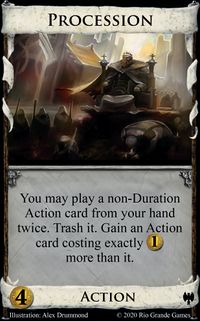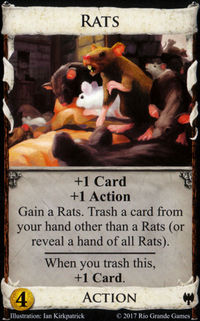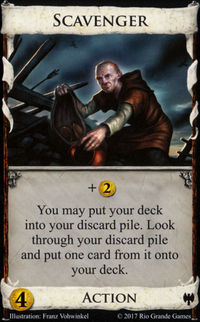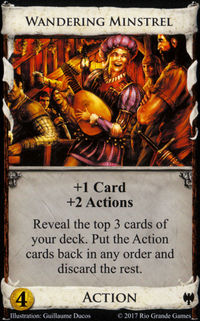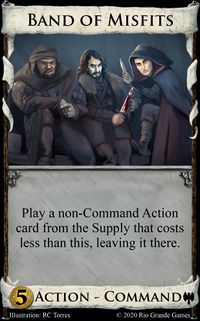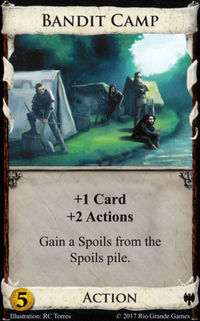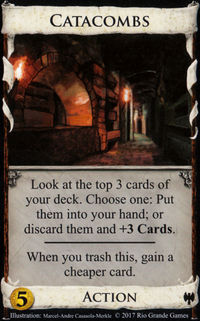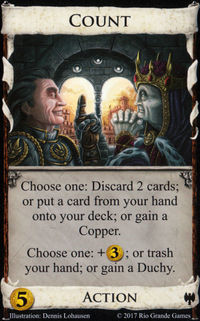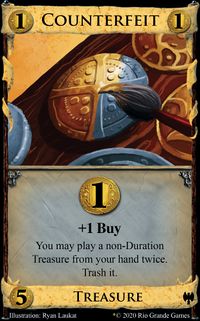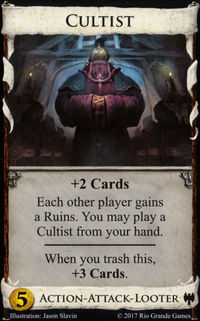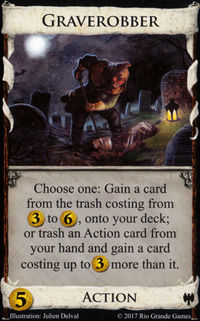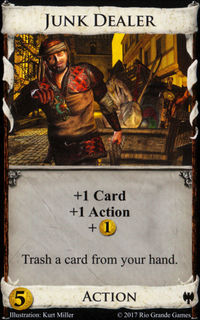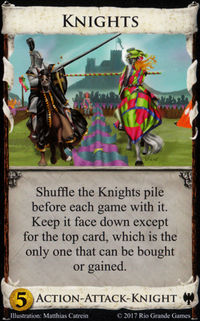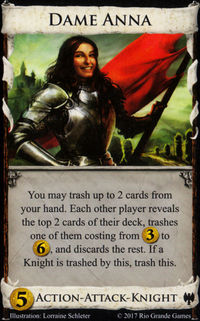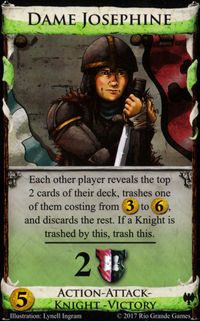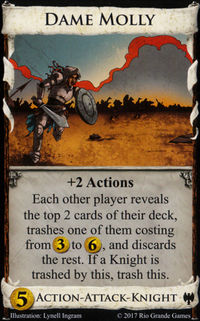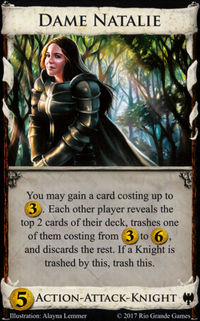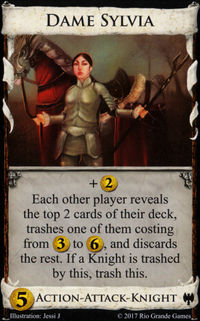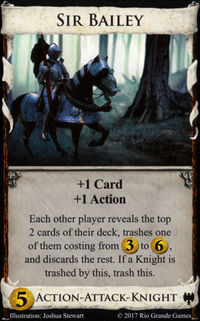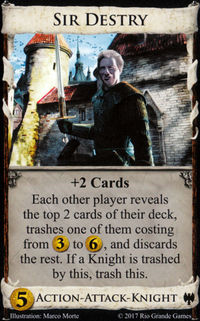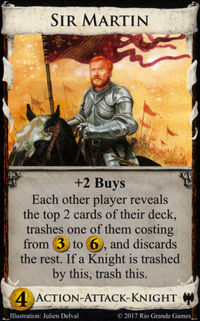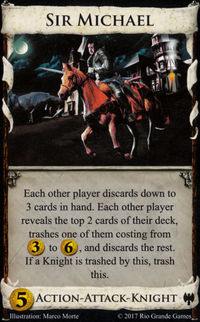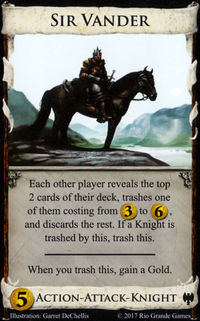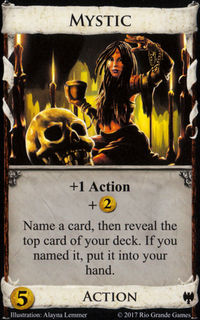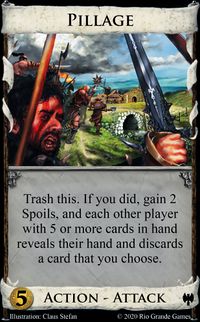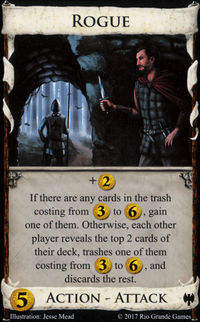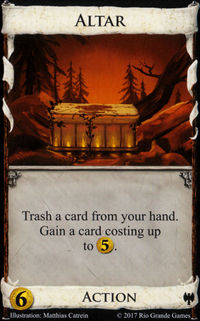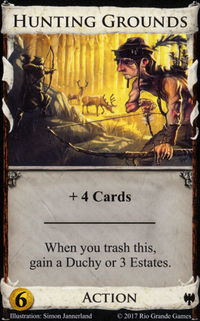Shelter
Werothegreat (Talk | contribs) m (→Strategy Article) |
m |
||
| (31 intermediate revisions by 15 users not shown) | |||
| Line 1: | Line 1: | ||
| − | [[Image: | + | [[Image:Shelters.png|thumb|right|200px|[[Overgrown Estate]], [[Hovel]] and [[Necropolis]], the three Shelter cards.]] |
| − | ''' | + | '''Shelter''' is a [[card type]] from [[Dark Ages]]. In games using [[Kingdom card]]s from Dark Ages, Shelters may be used in players' starting decks instead of the {{Card|Estate|Estates}} that starting decks usually contain. Shelters do not have a [[Supply]] pile; the only ones in the game are the ones that players start with. Although they cannot be bought, Shelters have a cost of {{Cost|1}}. |
| − | Shelter cards have a red frame—however, since every Shelter card has two [[type | + | Shelter cards have a red frame—however, since every Shelter card has two [[type]]s, each Shelter's frame is half red and half the color associated with its other type. |
There are three differently-named Shelters; each player's deck starts with one of each: | There are three differently-named Shelters; each player's deck starts with one of each: | ||
| + | * {{Card|Overgrown Estate}}—a [[Victory]]–Shelter | ||
* {{Card|Hovel}}—a [[Reaction]]–Shelter | * {{Card|Hovel}}—a [[Reaction]]–Shelter | ||
| − | * {{Card|Necropolis}}—an [[Action]]–Shelter | + | * {{Card|Necropolis}}—an [[Action]]–Shelter<br> |
| − | + | ||
| − | + | ||
== Additional rules == | == Additional rules == | ||
The rules for playing with Shelters are described in the Dominion: [[Dark Ages]] rulebook and are reproduced here. | The rules for playing with Shelters are described in the Dominion: [[Dark Ages]] rulebook and are reproduced here. | ||
| Line 15: | Line 14: | ||
* If only Kingdom cards from Dark Ages are being used this game, the Shelter cards replace starting {{Card|Estate|Estates}} - each player's starting deck is seven {{Card|Copper|Coppers}}, a {{Card|Hovel}}, a {{Card|Necropolis}}, and an {{Card|Overgrown Estate}}. | * If only Kingdom cards from Dark Ages are being used this game, the Shelter cards replace starting {{Card|Estate|Estates}} - each player's starting deck is seven {{Card|Copper|Coppers}}, a {{Card|Hovel}}, a {{Card|Necropolis}}, and an {{Card|Overgrown Estate}}. | ||
* If a mix of Kingdom cards from Dark Ages and other sets is being used, then the use of Shelters should be determined randomly, based on the proportion of Dark Ages cards in use. For example, choose a random Kingdom card being used - such as the last card dealt from the Randomizer deck - and if it is from Dark Ages, use Shelters in place of starting Estates. | * If a mix of Kingdom cards from Dark Ages and other sets is being used, then the use of Shelters should be determined randomly, based on the proportion of Dark Ages cards in use. For example, choose a random Kingdom card being used - such as the last card dealt from the Randomizer deck - and if it is from Dark Ages, use Shelters in place of starting Estates. | ||
| − | * Do not use the same card to choose whether or not to use Shelters as you use to choose whether or not to use {{Card|Platinum}} and {{Card|Colony}} (from | + | * Do not use the same card to choose whether or not to use Shelters as you use to choose whether or not to use {{Card|Platinum}} and {{Card|Colony}} (from {{Set|Prosperity}}). |
* Using Shelters does not change the Estate Supply pile; it still contains 8 Estates for 2 players and 12 Estates for 3 or more players. | * Using Shelters does not change the Estate Supply pile; it still contains 8 Estates for 2 players and 12 Estates for 3 or more players. | ||
== FAQ == | == FAQ == | ||
=== Official FAQ === | === Official FAQ === | ||
| − | === Other | + | * Dark Ages includes Shelters - {{Card|Hovel}}, {{Card|Necropolis}}, and {{Card|Overgrown Estate}}. |
| + | * These cards replace starting Estates in some games, as described under [[#Preparation|Preparation]]. | ||
| + | * Shelters have no corresponding [[Supply]] pile; they can never be bought, and {{Card|Ambassador}} (from {{Set|Seaside}}) cannot return one anywhere. | ||
| + | |||
| + | === Other rules clarifications === | ||
* It is allowed to reveal a Shelter when playing {{Card|Ambassador}}. In that case, it is not returned to the Supply (since it is not in the Supply) and opponents do not gain a copy of it. | * It is allowed to reveal a Shelter when playing {{Card|Ambassador}}. In that case, it is not returned to the Supply (since it is not in the Supply) and opponents do not gain a copy of it. | ||
| − | == Strategy | + | == Strategy == |
| − | + | Since Shelters differ from {{Card|Estate|Estates}} in several ways, their presence in your starting deck impacts various strategic considerations. | |
| + | # Their lower cost, at {{Cost|1}} instead of {{Cost|2}}, reduces the potential value of using [[trash-for-benefit]] effects, such as {{Card|Salvager}}, to trash your starting cards. This can be a particular problem for cards like {{Card|Upgrade}}: unless there is a desirable card available at {{Cost|2}}, such as {{Card|Border Guard}}, trashing a Shelter will force you to gain an {{Card|Estate}} or another useless card. | ||
| + | # The fact that three of your starting cards are unique rather than identical has a few implications. The most likely to be relevant are those that relate to [[thinning]]: Shelters are easier to thin with {{Card|Temple}} and provide more payoffs with {{Card|Bounty Hunter}}, but it's unlikely to be efficient to {{Event|Banish}} them. Before you've thinned your Shelters, or in cases where this is impossible, they improve your chances of activating {{Card|Menagerie}} but make drawing with {{Card|Hunting Party}} less effective. Finally, if you keep them in your deck until the end of the game, they will give you extra {{VP}} with {{Landmark|Museum}} but impose a {{VP}} penalty with {{Landmark|Wolf Den}}. | ||
| + | # Unlike in other games, you start with no {{Card|Estate|Estates}}, which devalues effects that benefit from their automatic presence in your deck, such as {{Card|Baron}}, {{Card|Rebuild}}, and {{Event|Inheritance}}. | ||
| + | Beyond these issues, each of the Shelters also has some unique properties which lead to other considerations and interactions. | ||
| − | + | As an [[Action]] card that starts the game in your deck, {{Card|Necropolis}} sometimes has a major impact on what you can do in the [[opening]], even though its [[Village (card category)|village]] effect is irrelevant at first. {{Card|Necropolis}} is a prime target for effects that require you to trash an Action card, and in cases like {{Event|Advance}} and {{Card|Animal Fair}}, it's often worth activating this ability immediately. The presence of a [[Way]] can also be important: for example, {{Way|Way of the Sheep}} guarantees you can buy a card costing {{Cost|5}} in the opening. Later in the game, many Ways continue to be situationally more useful than {{Card|Necropolis|Necropolis's}} effect, making it worth keeping in your deck. {{Way|Way of the Horse}} is especially noteworthy: because {{Card|Necropolis}} has no pile to return to, this Way makes it equivalent to a {{Card|Laboratory}} that you start out with for free. In some games, {{Card|Necropolis}} can eventually become useful for its village effect, although this is weak, coming in the form of a [[stop card]] with no other bonus. Its presence sometimes enables you to somewhat delay the purchase of other villages, and can occasionally resolve early [[terminal]] [[collision]], although it's still often better to thin it if you can. Alternatively, if the Kingdom offers strong deck control but no other villages, keeping your {{Card|Necropolis}} can be worthwhile, as it will allow you to consistently play an extra [[terminal]] each turn once you are drawing your deck. | |
| − | + | {{Card|Hovel}} not only provides no {{VP}} but lacks the [[Victory]] card type entirely, meaning that it lacks even the minor advantages of {{Card|Estate|Estates}} in e.g. providing [[draw]] when revealed by {{Card|Ironmonger}}. The fact that it can be trashed when you gain a [[Victory]] card is its most useful feature: for example, its presence in your hand may slightly increase the attraction of gaining an [[alt-VP]] card that is useful for your deck in any case, such as {{Card|Mill}}. When considering whether to gain a Victory card to trash {{Card|Hovel}}, it is important to assess the long-term effect on the number of stop cards in your deck. For example, if you buy your first {{Card|Province}} and trash a {{Card|Hovel}}, you’ve added zero stop cards on net. If, on the other hand, you were to gain an {{Card|Estate}} in the early game to trash {{Card|Hovel}}, the number of stop cards would not immediately change, but once you start [[greening]] and buy your first {{Card|Province}} the number of stop cards increases by one, meaning you effectively have taken an extra {{Card|Estate}} for no particular benefit. Occasionally, however, it can be worth trashing {{Card|Hovel}} by buying an {{Card|Estate}} when you have {{Cost|2}} and nothing better to buy if the {{Card|Estate}} can be put to use in some way that {{Card|Hovel}} couldn't (perhaps in feeding a trash-for-benefit effect or using it for draw with {{Project|Crop Rotation}}). | |
| − | + | {{Card|Overgrown Estate}} is often an attractive target for trashing as early as possible, since doing so provides some [[cycling]] and is reasonably likely to draw a {{Card|Copper}} in the early game, increasing your {{Cost}} output that turn. However, it's worth paying attention to cases where this effect could trigger an undesirable shuffle or draw a card dead, in which case it may be better to trash something else. Since {{Card|Overgrown Estate}} does have the Victory type, it does interact with some of the same effects as {{Card|Estate}} (such as {{Card|Rebuild}} and {{Card|Shepherd}}), but these are still unlikely to be worth using. | |
| − | + | ===External strategy articles=== | |
| + | ''Note: Article(s) below are by individual authors and may not represent the community's current views on cards, but may provide more in-depth information or give historical perspective. Caveat emptor.'' | ||
| + | * [http://forum.dominionstrategy.com/index.php?topic=6369.0 werothegreat's 2013 article] | ||
| − | + | == Card gallery == | |
| − | + | {{CardImage|Hovel}}{{CardImage|Necropolis}}{{CardImage|Overgrown Estate}} | |
| − | + | ||
| − | + | ||
| − | + | ||
| − | + | ||
| − | + | == Trivia == | |
| + | === In other languages === | ||
| + | * Czech: Útočiště (lit. ''refuge'') | ||
| + | * Dutch: Onderdak | ||
| + | * Finnish: Suoja | ||
| + | * German: Unterschlupf | ||
| + | * Japanese: 避難所 (pron. ''hinanjo'') | ||
| + | * Russian: Убежище (pron. ''ubyezhishshye'') | ||
| − | + | === Preview === | |
| − | + | {{Quote|Text=Here they are at last, the Shelters. In an all Dark Ages game, your starting deck is 7 {{Card|Copper|Coppers}}, {{Card|Necropolis}}, {{Card|Overgrown Estate}}, {{Card|Hovel}}. When mixing sets up, the rule for using Shelters is similar to the {{Card|Platinum}} / {{Card|Colony}} rule. | |
| − | + | ||
| − | + | ||
| − | + | ||
| − | + | ||
| − | + | Shelters may not be worth the 1 {{VP}} of an Estate, but they are way better to have in your deck. Necropolis lets you go a little heavier on [[terminal]]s from the get-go. Overgrown Estate gives you an extra little treat if you ever manage to trash it. And Hovel has a built-in way to get rid of it - you move out of that Hovel, and into a nice {{Card|Duchy}} or something. | |
| − | + | You can't buy Shelters, but they cost {{Cost|1}}. That's just to shake up how various cards interact with them. A {{Card|Remodel}} doesn't take you as far as it used to. And with only one being a Victory card, that {{Card|Crossroads}} doesn't go to as many places. {{Card|Baron}} doesn't know what to do with these. And an {{Card|Ambassador}} can't even give them away, since they have no piles to return to. On the other hand, they are fine places to get animals for your {{Card|Menagerie}}. And how much exactly can you build {{Card|Fairgrounds}} up to now, in games without {{Card|Black Market}}? Man. A lot. | |
| − | + | | Name=[[Donald X. Vaccarino]] | |
| − | + | |Source=[http://forum.dominionstrategy.com/index.php?topic=3939.0 Dark Ages Preview #5: Necropolis, Overgrown Estate, Hovel] | |
| − | + | ||
| − | {{ | + | |
| − | + | ||
| − | + | ||
| − | + | ||
| − | + | ||
| − | + | ||
| − | + | ||
| − | + | ||
| − | + | ||
| − | + | ||
| − | + | ||
| − | | | + | |
| − | + | ||
| − | + | ||
| − | + | ||
| − | + | ||
| − | + | ||
| − | |Source=[http://forum.dominionstrategy.com/index.php?topic= | + | |
}} | }} | ||
| − | |||
| − | |||
| − | |||
| − | |||
| − | |||
| − | |||
| − | |||
| − | |||
| − | |||
| − | |||
| − | |||
| − | |||
| − | |||
| − | |||
| − | |||
| − | |||
=== Secret History === | === Secret History === | ||
| − | {{Quote|Text= | + | {{Quote|Text=<p> |
| − | + | Tom Lehmann suggested replacing starting Estates with something else, to make the environment feel more Dark Ages-y. I thought this was a great idea. [[Ruins]] obv. doesn't work, because some people would make out, unless we picked specific ones. And Curse isn't very interesting. But I could just make up three new cards, which is what I did. {{Card|Necropolis}} shakes up early turns, since you can stomach more in the way of terminal actions; {{Card|Overgrown Estate}} gives you a little prize if you crack it open eventually; and {{Card|Hovel}} tempts you into buying a victory card when you might not have.</p> | |
| − | + | ||
Hovel is the only one that changed. Originally it was an action you could trash by discarding your hand. It turned out that trashing it turn 1-2 usually seemed like the correct play, even if you drew it with four Coppers. So that was no good. Hovel as printed has nice flavor going for it; you move out of your old Hovel and into a nice Duchy. | Hovel is the only one that changed. Originally it was an action you could trash by discarding your hand. It turned out that trashing it turn 1-2 usually seemed like the correct play, even if you drew it with four Coppers. So that was no good. Hovel as printed has nice flavor going for it; you move out of your old Hovel and into a nice Duchy. | ||
|Name=[[Donald X. Vaccarino]] | |Name=[[Donald X. Vaccarino]] | ||
| Line 101: | Line 73: | ||
{{Navbox Dark Ages}} | {{Navbox Dark Ages}} | ||
{{Navbox card types}} | {{Navbox card types}} | ||
| − | [[Category: | + | [[Category:Single-expansion special card types]] |
Latest revision as of 09:42, 19 July 2022
Shelter is a card type from Dark Ages. In games using Kingdom cards from Dark Ages, Shelters may be used in players' starting decks instead of the Estates that starting decks usually contain. Shelters do not have a Supply pile; the only ones in the game are the ones that players start with. Although they cannot be bought, Shelters have a cost of .
Shelter cards have a red frame—however, since every Shelter card has two types, each Shelter's frame is half red and half the color associated with its other type.
There are three differently-named Shelters; each player's deck starts with one of each:
- Overgrown Estate—a Victory–Shelter
- Hovel—a Reaction–Shelter
- Necropolis—an Action–Shelter
Contents |
[edit] Additional rules
The rules for playing with Shelters are described in the Dominion: Dark Ages rulebook and are reproduced here.
[edit] Preparation
- If only Kingdom cards from Dark Ages are being used this game, the Shelter cards replace starting Estates - each player's starting deck is seven Coppers, a Hovel, a Necropolis, and an Overgrown Estate.
- If a mix of Kingdom cards from Dark Ages and other sets is being used, then the use of Shelters should be determined randomly, based on the proportion of Dark Ages cards in use. For example, choose a random Kingdom card being used - such as the last card dealt from the Randomizer deck - and if it is from Dark Ages, use Shelters in place of starting Estates.
- Do not use the same card to choose whether or not to use Shelters as you use to choose whether or not to use Platinum and Colony (from Prosperity).
- Using Shelters does not change the Estate Supply pile; it still contains 8 Estates for 2 players and 12 Estates for 3 or more players.
[edit] FAQ
[edit] Official FAQ
- Dark Ages includes Shelters - Hovel, Necropolis, and Overgrown Estate.
- These cards replace starting Estates in some games, as described under Preparation.
- Shelters have no corresponding Supply pile; they can never be bought, and Ambassador (from Seaside) cannot return one anywhere.
[edit] Other rules clarifications
- It is allowed to reveal a Shelter when playing Ambassador. In that case, it is not returned to the Supply (since it is not in the Supply) and opponents do not gain a copy of it.
[edit] Strategy
Since Shelters differ from Estates in several ways, their presence in your starting deck impacts various strategic considerations.
- Their lower cost, at instead of , reduces the potential value of using trash-for-benefit effects, such as Salvager, to trash your starting cards. This can be a particular problem for cards like Upgrade: unless there is a desirable card available at , such as Border Guard, trashing a Shelter will force you to gain an Estate or another useless card.
- The fact that three of your starting cards are unique rather than identical has a few implications. The most likely to be relevant are those that relate to thinning: Shelters are easier to thin with Temple and provide more payoffs with Bounty Hunter, but it's unlikely to be efficient to Banish them. Before you've thinned your Shelters, or in cases where this is impossible, they improve your chances of activating Menagerie but make drawing with Hunting Party less effective. Finally, if you keep them in your deck until the end of the game, they will give you extra
 with Museum but impose a
with Museum but impose a  penalty with Wolf Den.
penalty with Wolf Den.
- Unlike in other games, you start with no Estates, which devalues effects that benefit from their automatic presence in your deck, such as Baron, Rebuild, and Inheritance.
Beyond these issues, each of the Shelters also has some unique properties which lead to other considerations and interactions.
As an Action card that starts the game in your deck, Necropolis sometimes has a major impact on what you can do in the opening, even though its village effect is irrelevant at first. Necropolis is a prime target for effects that require you to trash an Action card, and in cases like Advance and Animal Fair, it's often worth activating this ability immediately. The presence of a Way can also be important: for example, Way of the Sheep guarantees you can buy a card costing in the opening. Later in the game, many Ways continue to be situationally more useful than Necropolis's effect, making it worth keeping in your deck. Way of the Horse is especially noteworthy: because Necropolis has no pile to return to, this Way makes it equivalent to a Laboratory that you start out with for free. In some games, Necropolis can eventually become useful for its village effect, although this is weak, coming in the form of a stop card with no other bonus. Its presence sometimes enables you to somewhat delay the purchase of other villages, and can occasionally resolve early terminal collision, although it's still often better to thin it if you can. Alternatively, if the Kingdom offers strong deck control but no other villages, keeping your Necropolis can be worthwhile, as it will allow you to consistently play an extra terminal each turn once you are drawing your deck.
Hovel not only provides no ![]() but lacks the Victory card type entirely, meaning that it lacks even the minor advantages of Estates in e.g. providing draw when revealed by Ironmonger. The fact that it can be trashed when you gain a Victory card is its most useful feature: for example, its presence in your hand may slightly increase the attraction of gaining an alt-VP card that is useful for your deck in any case, such as Mill. When considering whether to gain a Victory card to trash Hovel, it is important to assess the long-term effect on the number of stop cards in your deck. For example, if you buy your first Province and trash a Hovel, you’ve added zero stop cards on net. If, on the other hand, you were to gain an Estate in the early game to trash Hovel, the number of stop cards would not immediately change, but once you start greening and buy your first Province the number of stop cards increases by one, meaning you effectively have taken an extra Estate for no particular benefit. Occasionally, however, it can be worth trashing Hovel by buying an Estate when you have and nothing better to buy if the Estate can be put to use in some way that Hovel couldn't (perhaps in feeding a trash-for-benefit effect or using it for draw with Crop Rotation).
but lacks the Victory card type entirely, meaning that it lacks even the minor advantages of Estates in e.g. providing draw when revealed by Ironmonger. The fact that it can be trashed when you gain a Victory card is its most useful feature: for example, its presence in your hand may slightly increase the attraction of gaining an alt-VP card that is useful for your deck in any case, such as Mill. When considering whether to gain a Victory card to trash Hovel, it is important to assess the long-term effect on the number of stop cards in your deck. For example, if you buy your first Province and trash a Hovel, you’ve added zero stop cards on net. If, on the other hand, you were to gain an Estate in the early game to trash Hovel, the number of stop cards would not immediately change, but once you start greening and buy your first Province the number of stop cards increases by one, meaning you effectively have taken an extra Estate for no particular benefit. Occasionally, however, it can be worth trashing Hovel by buying an Estate when you have and nothing better to buy if the Estate can be put to use in some way that Hovel couldn't (perhaps in feeding a trash-for-benefit effect or using it for draw with Crop Rotation).
Overgrown Estate is often an attractive target for trashing as early as possible, since doing so provides some cycling and is reasonably likely to draw a Copper in the early game, increasing your output that turn. However, it's worth paying attention to cases where this effect could trigger an undesirable shuffle or draw a card dead, in which case it may be better to trash something else. Since Overgrown Estate does have the Victory type, it does interact with some of the same effects as Estate (such as Rebuild and Shepherd), but these are still unlikely to be worth using.
[edit] External strategy articles
Note: Article(s) below are by individual authors and may not represent the community's current views on cards, but may provide more in-depth information or give historical perspective. Caveat emptor.
[edit] Card gallery
[edit] Trivia
[edit] In other languages
- Czech: Útočiště (lit. refuge)
- Dutch: Onderdak
- Finnish: Suoja
- German: Unterschlupf
- Japanese: 避難所 (pron. hinanjo)
- Russian: Убежище (pron. ubyezhishshye)
[edit] Preview
Shelters may not be worth the 1 ![]() of an Estate, but they are way better to have in your deck. Necropolis lets you go a little heavier on terminals from the get-go. Overgrown Estate gives you an extra little treat if you ever manage to trash it. And Hovel has a built-in way to get rid of it - you move out of that Hovel, and into a nice Duchy or something.
of an Estate, but they are way better to have in your deck. Necropolis lets you go a little heavier on terminals from the get-go. Overgrown Estate gives you an extra little treat if you ever manage to trash it. And Hovel has a built-in way to get rid of it - you move out of that Hovel, and into a nice Duchy or something.
[edit] Secret History
Tom Lehmann suggested replacing starting Estates with something else, to make the environment feel more Dark Ages-y. I thought this was a great idea. Ruins obv. doesn't work, because some people would make out, unless we picked specific ones. And Curse isn't very interesting. But I could just make up three new cards, which is what I did. Necropolis shakes up early turns, since you can stomach more in the way of terminal actions; Overgrown Estate gives you a little prize if you crack it open eventually; and Hovel tempts you into buying a victory card when you might not have.
Hovel is the only one that changed. Originally it was an action you could trash by discarding your hand. It turned out that trashing it turn 1-2 usually seemed like the correct play, even if you drew it with four Coppers. So that was no good. Hovel as printed has nice flavor going for it; you move out of your old Hovel and into a nice Duchy.
